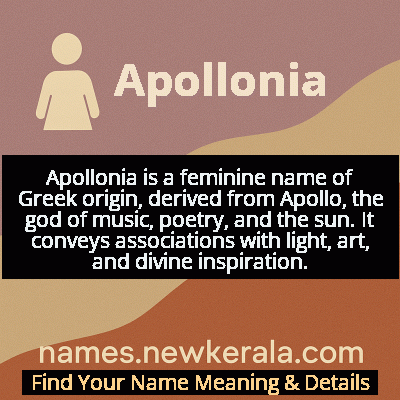Apollonia Name Meaning & Details
Origin, Popularity, Numerology Analysis & Name Meaning of Apollonia
Discover the origin, meaning, and cultural significance of the name APOLLONIA. Delve into its historical roots and explore the lasting impact it has had on communities and traditions.
Name
Apollonia
Gender
Female
Origin
Greek
Lucky Number
5
Meaning of the Name - Apollonia
Apollonia is a feminine name of Greek origin, derived from Apollo, the god of music, poetry, and the sun. It conveys associations with light, art, and divine inspiration.
Apollonia - Complete Numerology Analysis
Your Numerology Number
Based on Pythagorean Numerology System
Ruling Planet
Mercury
Positive Nature
Adventurous, dynamic, curious, and social.
Negative Traits
Restless, impatient, inconsistent, prone to indulgence.
Lucky Colours
Green, white.
Lucky Days
Wednesday.
Lucky Stones
Emerald.
Harmony Numbers
1, 3, 9.
Best Suited Professions
Sales, marketing, travel, entertainment.
What People Like About You
Versatility, charisma, adventurous spirit.
Famous People Named Apollonia
Saint Apollonia
Christian Martyr
Patron saint of dentistry, early Christian deaconess martyred for her faith
Apollonia Kotero
Singer and Actress
Starred in Purple Rain and fronted the girl group Apollonia 6
Apollonia of Tyre
Ancient Noblewoman
Wealthy and influential figure in ancient Mediterranean politics
Apollonia Sabata
Italian Noblewoman
Renaissance philanthropist and religious founder
Name Variations & International Equivalents
Click on blue names to explore their detailed meanings. Gray names with will be available soon.
Cultural & Historical Significance
During the Renaissance, Apollonia experienced renewed interest as European scholars rediscovered classical Greek culture. The name appeared among noble families and intellectual circles who valued its classical heritage and artistic connotations. In the modern era, Apollonia maintains its prestige as a name that bridges ancient wisdom with contemporary sophistication. The character of Apollonia Vitelli in 'The Godfather' films and actress Apollonia Kotero's role in 'Purple Rain' introduced the name to wider audiences while preserving its aura of elegance and mystery. Today, the name represents a unique blend of mythological grandeur, religious history, and artistic legacy that continues to appeal to parents seeking a name with depth and distinction.
Extended Personality Analysis
Individuals named Apollonia are typically perceived as possessing a unique blend of intellectual depth and creative flair. They often exhibit the radiant confidence associated with their namesake god Apollo, combined with intuitive understanding and emotional intelligence. Apollonias tend to be natural leaders who inspire others through both their competence and their charisma. Their thinking patterns often balance logical analysis with creative insight, allowing them to solve problems in innovative ways. They're frequently drawn to artistic pursuits, whether as practitioners or appreciators, and have a natural affinity for music, literature, and visual arts.
In social settings, Apollonias are often the center of attention without seeking it—their combination of intelligence, warmth, and authenticity naturally draws people to them. They tend to be excellent communicators who can articulate complex ideas clearly and persuasively. While they enjoy social interaction, they also value their independence and require periods of solitude for reflection and creative renewal. Their strong sense of self allows them to maintain integrity under pressure, and they often serve as moral compasses in their communities. The name suggests someone who is both grounded and visionary, practical in their approach to life's challenges while maintaining sight of higher ideals and possibilities. This balance between earthly competence and spiritual awareness makes Apollonias particularly effective in roles that require both technical skill and human understanding.
Modern Usage & Popularity
In contemporary naming practices, Apollonia occupies a unique position as a classical name that remains refreshingly uncommon. According to recent data from various national naming registries, Apollonia appears extremely rarely—typically ranking outside the top 1000 names in English-speaking countries. In the United States, the Social Security Administration records show fewer than 50 births named Apollonia annually, maintaining its status as an exclusive choice. The name sees slightly higher usage in countries with stronger Greek cultural connections, such as Greece itself, Cyprus, and Italy, though it remains uncommon even in these regions. Modern parents who choose Apollonia often do so because they seek a name with substantial historical and mythological weight that hasn't been overused. The name appeals particularly to families with interests in classical studies, the arts, or those seeking to honor Greek heritage. Recent trends toward mythological and vintage names suggest Apollonia may experience gradual increased interest, though its distinctive length and classical sound likely prevent mass adoption. The name's continued appearance in popular culture ensures it remains recognizable while maintaining its elegant, somewhat mysterious quality.
Symbolic & Spiritual Meanings
Symbolically, Apollonia represents a rich tapestry of meanings drawn from its mythological origins and historical associations. Most fundamentally, it embodies the concept of illumination—both the literal light of the sun (connecting to Apollo's role as sun god) and the metaphorical light of knowledge, truth, and artistic inspiration. The name symbolizes the harmonious integration of seemingly opposing forces: reason and intuition, science and art, discipline and creativity. This balance reflects Apollo's domains, which included both the rational (prophecy, medicine) and the creative (music, poetry). Apollonia also carries connotations of healing and purification, connecting to Apollo's function as a god who could both cause and cure plagues. The prophetic aspect suggests foresight, wisdom, and the ability to see patterns and possibilities that others might miss. In personal development terms, the name represents the journey toward self-mastery and the expression of one's highest potential. The laurel wreath, sacred to Apollo, symbolizes victory, achievement, and poetic excellence—all qualities associated with the name. Overall, Apollonia serves as a powerful symbolic representation of enlightened consciousness, creative power, and the pursuit of excellence in all aspects of life.

